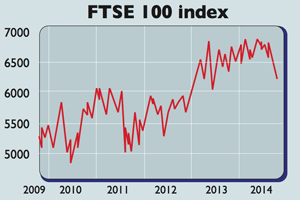
“Markets need to check into the Betty Ford Center and go into rehab, to wean themselves off this addiction to central bank support,” says Adrian Miller of GMP Securities.
Last week the S&P 500 saw its worst three-day drop since 2011, and hit six-month lows. European and UK stockmarkets (see chart) slid to their lowest levels in over a year.
But on Friday markets perked up as central bankers made soothing noises. The Bank of England’s (BoE) Andy Haldane said the BoE could keep interest rates lower for longer than previously anticipated.
In America, Federal Reserve member James Bullard said the US central bank should continue with its quantitative-easing (QE), or money-printing, programme rather than wind it up in October.
For five years now policymakers have “pumped up asset prices to buy time for a lasting recovery”, says Philip Aldrick in The Times.
Zero interest rates and injections of printed money led to an unprecedented liquidity boost for markets. So much so that bad data often boosted stocks, as they implied further money printing and another wave of cash reaching equity markets.
Now that the UK and US economies are improving, interest rates should rise. But markets have relied on central-bank liquidity for so long, “like a small child holding his dad’s hand when learning to ride the bike”, that they are scared to go without, says The Economist’s Buttonwood blog. “It is time to let go of the hand now, but there will be bumps and bruises along the way.”
Unfortunately, though, central bankers are rushing to the rescue “at the first whiff of panic”, says Aldrick. Low rates are blowing up bubbles in overpriced markets, risking a nastier crash later on if the party isn’t ended now. Central bankers are risking “turning monetary bail-outs into the new market religion”.
But investors hoping for more QE shouldn’t expect the UK and US to turn on the taps again in the near future.
For one thing, not all members of each central bank are behind the idea. And with both economies improving, central banks should surely keep their powder dry for a major economic shock – such as another eurozone crisis rearing up, perhaps.
If and when that happens, markets might finally lose faith in central banks’ stimulus measures and realise they aren’t omnipotent, says Gavyn Davies in the Financial Times. In which case, markets will “have entered much more dangerous waters”.